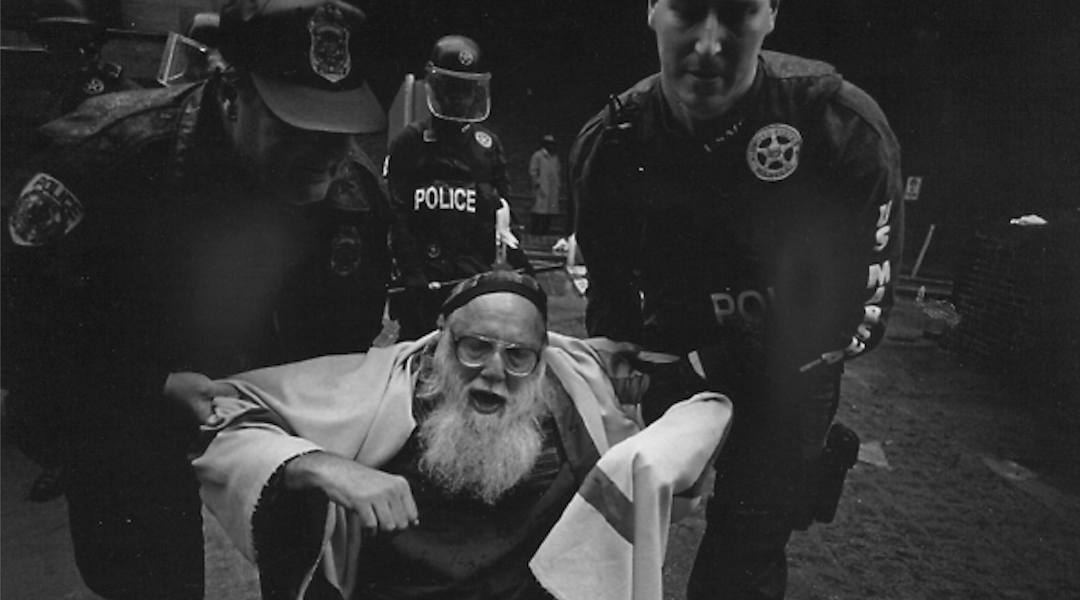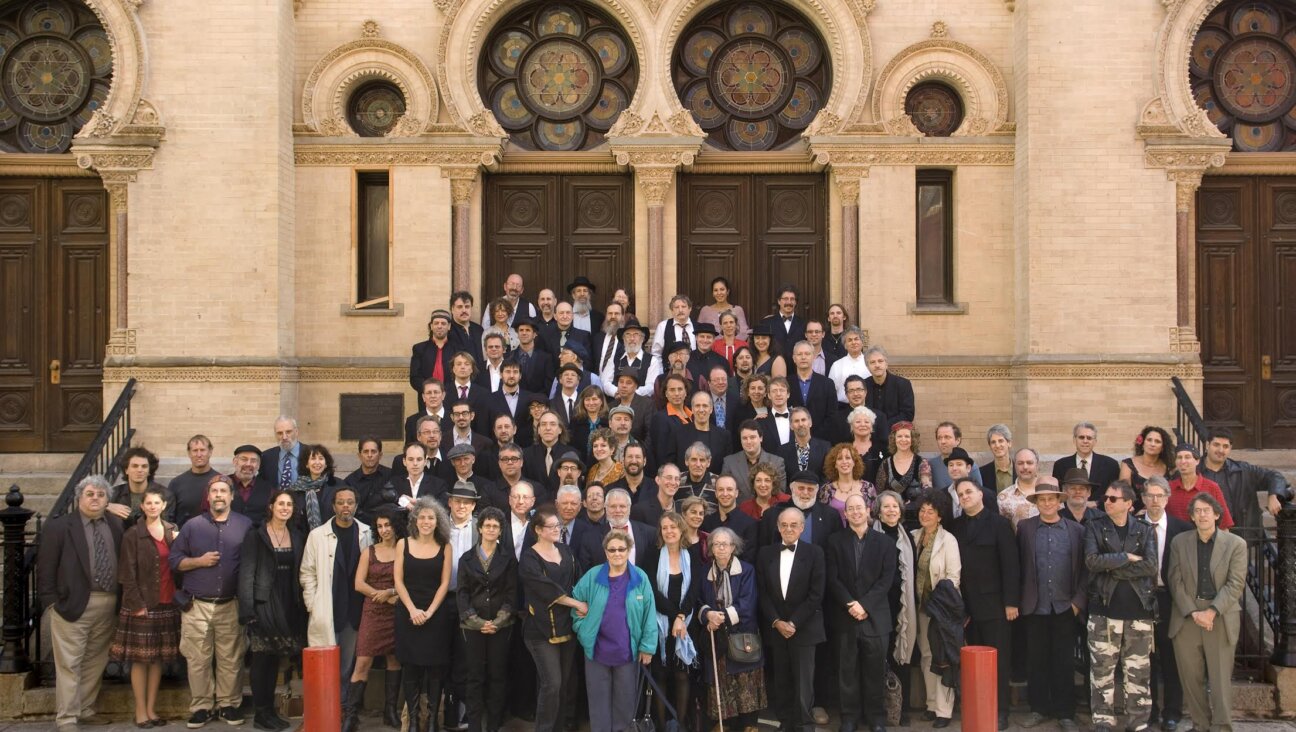Jewish in the Bible Belt

Image by jta
Sign up for Forwarding the News, our essential morning briefing with trusted, nonpartisan news and analysis, curated by senior writer Benyamin Cohen.
Sometimes, Benjamin Rosenthal thinks about leaving the small town of Indianola, Miss., pop. 11,000, where he spent most of his life.

Lynne and Robert Goldsmith Image by jta
He wants to go somewhere bigger, with more Jews.
“It’s very easy to lose your identity in the Bible Belt in a town when you are the religious minority,” said Rosenthal, 25.
In the Bible Belt, religion rules and Jesus is king, particularly in the small towns and cities that make up the region in the U.S. South. Jews comprise less than 1 percent of the population in the South, according to Louis Schmier, a professor of history at Valdosta State University in Georgia, with most living in large cities like Atlanta and Charlotte. Some so-called circuit rabbis travel hundreds of miles to different congregations, often with fewer than 50 members. One of the first questions a newcomer in the South is typically asked is “What church do y’all go to?”
A self-described “displaced New Yorker” from Manhattan’s Lower East Side, Schmier, 70, moved South in 1962 with his own stereotypes. “My image was that on Saturday night every Southerner got himself liquored up, put on his sheet and went out looking for – ” he said, using two unquotable terms for Jews and blacks. In reality, he said, “They’re a nice people down here.”
Nice, and often curious, says Rosie Perlstein, whose husband, Shaul, is rabbi of Chabad Lubavitch of Chattanooga.
“People are always calling and always want to learn about” Judaism, she said. “People ask in a nice way. They’re polite. They’ll ask about different holidays.”
The Perlsteins moved to Chattanooga from Brooklyn in 2009.
While many people have a respectful curiosity about Judaism, others think it’s their duty to spread the word of Jesus, the rabbi said. “It’s impossible to stop in the South,” he said.
The Perlsteins say that drive is not born of malice, but simple ignorance of other beliefs. This is a common sentiment expressed by Southern Jews.
“The rank-and-file citizenry here knows Judaism and respects Judaism, but doesn’t understand Judaism, doesn’t understand why we don’t accept Christ into our heart as our savior,” said Robert Goldsmith, executive director of the Blumberg Family Jewish Community Services of Dothan, Ala.
His wife, Lynne, is one of the traveling rabbis, as is Debra Kassoff. Based in Jackson, Miss., Kassoff makes a nearly 450-mile round-trip to Greenville, Miss., every other weekend. Rosenthal is among her congregants, traveling 30 miles to Greenville’s Hebrew Union Temple.
Kassoff previously had been director of rabbinic studies at the Goldring/Woldenberg Institute of Southern Jewish Life in Jackson, which runs the Museum of the Southern Jewish Experience, from 2003 to 2006. While there, she traveled a six-state region, conducting services in different cities that did not have a full-time rabbi.
“There’s a world of difference between a Boston sensibility and a Jackson or Greenville sensibility,” said Kassoff, who served as the rabbi at Temple Emanu-El in Marblehead, Mass., from 2006 to 2010.
“In Boston there is a large Jewish community. People can be Jewish, but not really show up,” she said. “In a place like Greenville, that is not as possible. It’s not possible to take for granted that there will continue to be services. We don’t have the same critical mass.”
It is the lack of critical mass that led Kassoff to suggest holding services only every other week at Hebrew Union, and also led the Blumberg Family Jewish Community Services to launch the Family Relocation Project in Dothan, which offers up to $50,000 financial assistance to Jewish families willing to relocate to Dothan for at least five years.
Stephanie Butler, 34, her husband Ken, also 34, were one of less than five families to take up the offer. In 2010, they left St. Petersburg, Fla. for Dothan. The Jewish community in their new home, she said, is close-knit, but very small indeed. Of more than 66,000 residents, only 65 families in the area are Jewish.
“Here there are people who have never met someone who is Jewish,” she said. “Whether or not I feel responsible for educating them, they always have a lot of questions. They have an interesting perspective about Jews being the chosen people. They’re like, ‘Oh, I respect you so much.’ And I’m like, ‘you don’t know me.’ They have preconceived notions about who and what Jews are.”
Still, she said, she has not experienced bigotry or anti-Semitism during her time in Dothan. Likewise, said Kassoff, many of her congregants in Greenville have told her they have encountered confusion, but not cruelty.
Rosenthal, however, said he has experienced some mild instances of anti-Semitism. “As a child, “I got told I was going to Hell because I killed Jesus. It frustrated me to no end,” he said.
One time, he added, a colleague asked him what he was doing for Easter. “You know,” she said, “because that’s the day y’all killed our lord and savior.”
The Perlsteins’ experience has been a little different. They say their family’s devotion to their religion evokes a certain respect, particularly in an area where faith has such a stronghold.
“I think people see that we’re Jewish, and that we’re proud of our religion and we hold it strong, and I feel like people have a strong respect for that,” Rosie Perlstein said. “Maybe it’s because they’re so religious. The idea of being proud of who you are instead of working on assimilating, I’ve found people to really respect that.”
She said her family is in Chattanooga to stay – on a mission to enrich the Jewish community in a small city in the Bible Belt.
Rosenthal, on the other hand, says he’s not certain he’ll remain in his small town. He had left Indianola for the University of Memphis, where he was active in Hillel and surrounded himself with Jewish friends – an experience that differed greatly from the private, Christian-based school he had attended growing up, where students prayed in Jesus’ name daily. After college, he moved back to Indianola, where he works as assistant director of information services at South Sunflower County Hospital.
“It is a lot better than it was when I was a child,” he said. “Coming back and being more mature helped.”
He says he doesn’t associate with the people from his childhood who tried to use his religion against him and he has a serious girlfriend who is in the process of converting to Judaism. Sometimes, he says, he struggles with a feeling of responsibility he feels toward his tiny community.
“I don’t want the Jewish culture and the Jewish community to die off in the Bible Belt,” he said. “But then, a part of me wants to get out.”
















